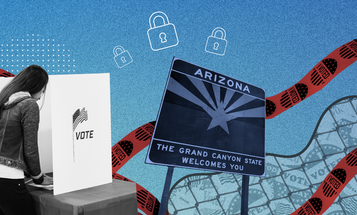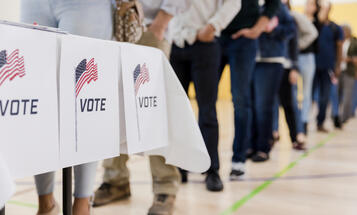
Ohio is Depriving Late-Jailed Citizens from Exercising Constitutional Rights, Lawsuit Says
COLUMBUS, OH – Today, Campaign Legal Center (CLC), Dēmos and the MacArthur Justice Center filed a class action lawsuit challenging Ohio’s policy of disenfranchising eligible voters arrested just prior to the election and held in detention through Election Day.
Under the current system, eligible voters who are detained pretrial by the state are being unconstitutionally denied their fundamental right to vote. Ohio’s disenfranchisement of these qualified voters violates the First Amendment and the Equal Protection Clause of the Fourteenth Amendment to the United States Constitution.
The three groups representing two individual plaintiffs and a proposed class of plaintiffs, filed a request for a temporary restraining order on Ohio’s practice, seeking to allow individuals who are held in pretrial detention in Ohio county jails to exercise their fundamental right to vote by casting an absentee ballot in today’s election.
This group of Ohio citizens includes registered eligible voters arrested and held in pretrial detention in Ohio on or after close of business on Friday, November 2 who are eligible to vote in Ohio.
"The criminal legal system in Ohio disproportionately jails poor people and people of color. Hundreds of eligible citizens are systematically prevented from exercising their fundamental rights," said Chiraag Bains, director of legal strategies at Dēmos. "The Secretary of State has the power to correct this injustice, and he must."
“No qualified voter should be categorically denied the right to vote. Ohio’s practice of refusing to provide ballots to late-jailed voters is particularly egregious because it most severely affects those who cannot afford bail,” said Mark Gaber, senior legal counsel at CLC. “Our laws should promote voting, not restrict it. Ohio violates the Constitution by fencing off a group of eligible voters and physically precluding them from voting.”
“It may be inconvenient to take the steps needed for people detained and awaiting trials to cast a ballot, but the right to vote is not taken away at the jail door,” said Laura C. Bishop, voting rights project attorney at the Roderick and Solange MacArthur Justice Center. “Voting is key to making democracy work and keeping people engaged with their communities. Governments should encourage, not erect barriers, to voting. Voting is more than a civic duty. It’s a right guaranteed by the U.S. Constitution.”
Ohio already has a procedure for use by voters who discover in the days leading up to an election that they are unable to reach the polls due to unforeseen hospitalization. Late-jailed voters could be easily accommodated by granting them access to the procedure available to late-hospitalized voters. The state recognizes that it has a compelling reason to facilitate the provision of ballots to late-hospitalized voters; so there is no reason to prevent late-jailed voters from using that procedure and casting their ballots as well.
In October, CLC sent a demand letter to Secretary Jon Husted informing him of Ohio’s lack of policy concerning late-jailed voters and outlined options the state could pursue to rectify the situation. CLC argued that Ohio was in violation of the First and Fourteenth Amendments to the U.S. Constitution by not affording late-jailed voters an option to cast a ballot.
The lawsuit today was filed in the United States District Court for the Southern District of Ohio Eastern Division. The case is called Mays v. Husted.
###



